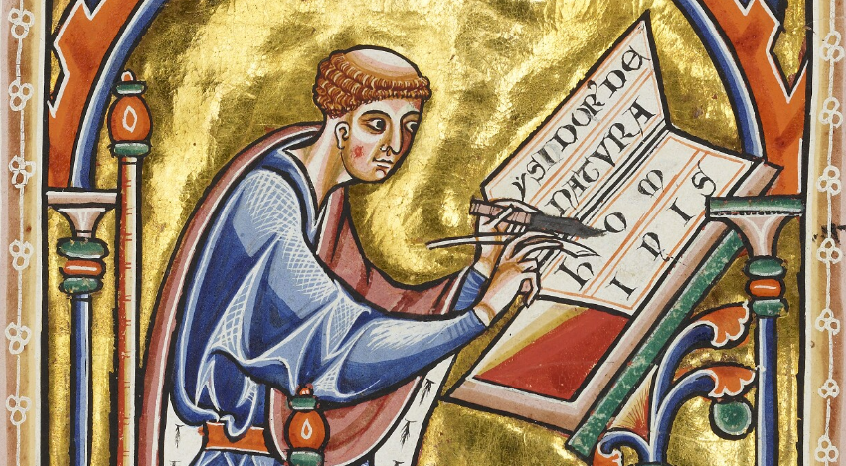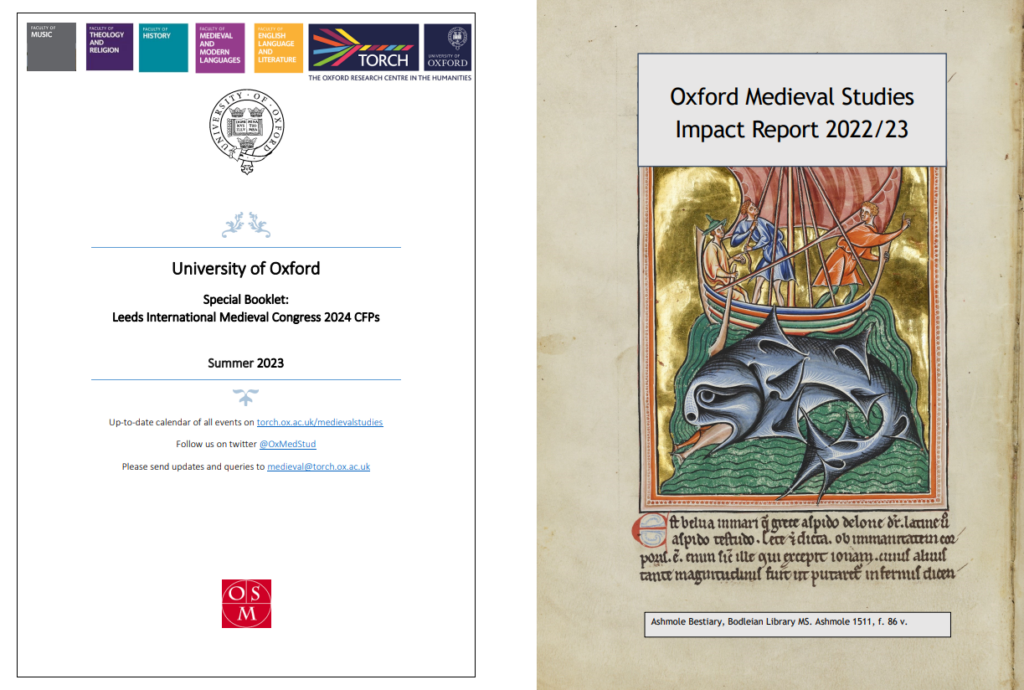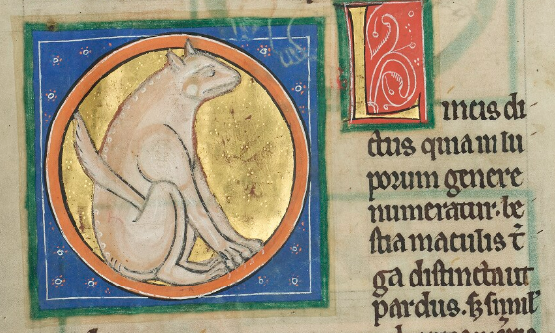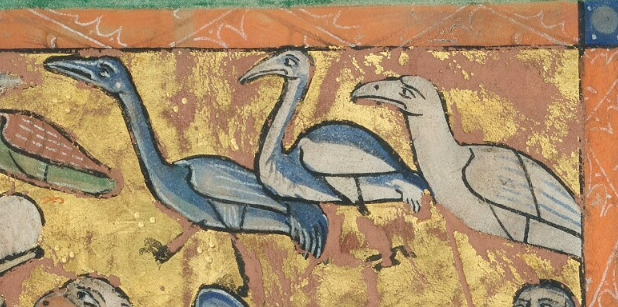I hope you are all well, and are enjoying a summer that is equal parts restful and productive. I come bearing various summer announcements.
Firstly, a sad announcement: this will be my final email in your inbox! After three years, the time has come for me to pass on the torch (or should that be TORCH?) in my role as Communications Officer and mentor for the MSt Medieval students. I will still be around Oxford, as I take up a new role at Jesus College in September, so I hope to still see many of you at events and seminars – but I pass the Medieval Matters torch into new hands. The role has been advertised by the Humanities Division with an application deadline of 2 September for a start with the new academic year. This is also an early alert for everybody to send entries to the booklet to the generic address medieval@torch.ox.ac.uk, not to my personal email.
I’ve loved doing this work: it’s not only been a great way to meet and engage with Oxford’s medievalists at every level, but also a way to foster the sense of community that makes Oxford so unique and so special. To my knowledge, nowhere has such a large, vibrant, active, and linked community. If you are an early career researcher, I really encourage you to apply for this role straight away! It’s a fantastic opportunity to meet and work alongside medievalists across the university and beyond, and to work alongside our newest medievalists on the MSt. I’ve been so inspired by our recent cohorts of graduate students, and it’s been such an honour to be a part of their development as scholars. If you want to get a feel for what the job involves, you can read about my experience in my post A Medieval Monologium, and the reflection by one of my predecessors, Karl Kinsella, on his time heralding Medieval Studies.
Read on for summer announcements, opportunites and a list of new book publications:
OMS Matters:
- Medieval Booklet Submissions: As we look towards the new year, please start thinking about your submissions for the Medieval Booklet. This year, all entries must be sent to medieval@torch.ox.ac.uk.
- New blog post: The TORCH Network Poetry in the Medieval World after Two Terms of Activity. Ugo Mondini reflects on the initial activities of the TORCH Network Poetry in the Medieval World. He shares the network’s journey so far, which has taken participants through the forms, languages, communities, and geographies of medieval poetry and the challenges its comparative study poses. To read all about the first two terms of the network, and to find out how to get involved next year, please click here.
- New blog post: Discoveries from New College’s Books of Hours. Caitlín Kane, Special Collections Curatorial Assistant New College writes about the showcase of the College’s collection of Books of Hours back in February of this year. To discover this collection, to find our more about Caitlín’s work on these manuscripts, and to read what happened at the workshop, please click here.
Opportunities and Announcements:
- The Medievalist Coffee Morning is restarting well ahead of term on Friday, 6 September in the Visiting Scholars Centre 10.30-11.30. Follow the link for instructions how to find it and a playlist of previous manuscript showcases. The first autumn coffee morning will be followed by the
- Medieval MSS Support Group at the Weston Library: We are pleased to trial a new session, once or twice a month, in which readers of medieval manuscripts can pose questions to a mixed group of fellow readers and Bodleian curators in a friendly environment. Come with your own questions, or to see what questions other readers have! If you wish to pose a question, please order the relevant manuscript to the issue desk, and email the details to Matthew Holford, Tolkien Curator of Medieval Manuscripts, the day before, so that he can arrange for it to be transferred across to the Horton Room for the session. The next session will be held on Friday, 6 September (Horton Room) 11.30-12.30. To find out more, click here.
- Winter School in Digital Humanities: The Institute for Medieval Research of the Austrian Academy of Sciences is organising a Winter School in Digital Humanities in Vienna in November-December 2024. The Winter School will take a hands-on approach to tools for handwritten text recognition in medieval documents. They will have sub-groups for Carolingian Latin, Late Latin, Byzantine Greek, Syriac, Medieval Czech and Medieval German. They have planned three virtual sessions starting in November 2024 and a three-day meeting in Vienna in December. To read more, and to apply, please click here. The deadline for applications is 15 September.
- CfP: Staging Silence from Antiquity to the Renaissance: 3–4 July 2025 / St John’s College, Cambridge. This two-day, in-person conference will explore developing traditions of silence in dramatic texts from antiquity to the Renaissance. Papers are sought from scholars across a range of fields, including classical reception, comparative literature, and medieval and/or early modern English literature. Please submit a 250-word abstract for a 20-minute paper to John Colley (stagingsilence@gmail.com) by noon on Thursday 9 January 2025. To read the full CfP, please click here.
- The last of the events organised by Living Stones, St Mary the Virgin, Iffley is coming up on Saturday 8 September, 2.00 – 5.00 Iffley Church Hall OX4 4EG. We explore the explosive influence of communication with the Arab world with Teresa Whitcombe, and the spread of secular music with Ian Pittaway. We hope to continue the theme next year with a focus on the symbolism of the architectural features and carvings around the church. Please get in touch if you are interested in sharing your research! For contact details and this year’s programme see https://livingstonesiffley.org.uk/events. To read more, please see the blogpost here.
New Publications:
- The Cambridge Anthology of British Medieval Latin by Carolinne White (Cambridge University Press). This anthology presents in two volumes a series of Latin texts (with English translation) produced in Britain during the period AD 450–1500. Excerpts are taken from Bede and other historians, from the letters of women written from their monasteries, from famous documents such as Domesday Book and Magna Carta, and from accounts and legal documents, all revealing the lives of individuals at home and on their travels across Britain and beyond. For more information, and to order with 20% off, click here and enter the code WHITE2023 at the checkout.
- From Fingal’s Cave to Camelot by Douglas Gray, edited by Jane Bliss (Independent Publishing Network, Oxford). Contact Jane Bliss for further details and/or to buy a copy. The book costs £17.00 plus postage for those outside Oxford, or free delivery via University Messenger Service to those within the University.
- Introduction to Middle High German by Howard Jones and Martin H. Jones (Oxford University Press). This book is a dedicated student edition of The Oxford Guide to Middle High German, designed for taught courses and self-study. It provides an accessible overview of the grammar and lexis of the language suitable for introductory-level students and includes thirty extensively-annotated texts with explanatory notes suitable for use in teaching. It is accompanied by a companion website which gives open access to further online resources for the study of Middle High German. There will be a free workshop day with a translatathon on 2 November 2024, introducing the book for anybody interested in Middle High German. Order online at global.oup.com/academic with promotion code AAFLYG6 to save 30%.
- The Life of Nuns: Love, Politics, and Religion in Medieval German Convents by Henrike Lähnemann and Eva Schlotheuber, trans. by Anne Simon (Open Book Publishers). Henrike Lähnemann and Eva Schlotheuber offer readers a vivid insight into the largely unknown lives and work of religious women in the fifteenth and sixteenth centuries. Using previously inaccessible personal diaries and letters, as well as tapestries, painting, architecture and music, the authors show that the nuns were, in fact, an active, even influential part of medieval society. Watch the launch during the Medieval Coffee Morning here. To read the book open access, click here. To purchase a paper copy with a 20% discount, use the code LONHL_24 at checkout. There will be a Book at Lunchtime event at TORCH on 13 November 2024 at 1pm.
- Translating Europe in Ælfric’s Lives of Saints by Luisa Ostacchini (Oxford University Press). This book offers the first book-length study of Ælfric’s Lives of Saints as a unified collection, provides new insight into Ælfric’s translation practices and the ways in which Latin materials were adapted for a vernacular audience, and presents important new insights into the role of Europe in the early medieval English imaginary, and into pre-modern insular-continental relations. For more information, and to order with 30% off, click here and enter code AAFLYG6 at the checkout.
- The Battle of Maldon: A New Critical Edition by Mark Griffith (Liverpool University Press). Mark Griffith’s new critical edition of the surviving Old English poem about the 991 AD Battle of Maldon offers a striking re-analysis of its marriage of old and new features of alliterative poetry. With an introduction, detailed commentary, and full glossary, it responds to the poem’s varied criticisms, and considers the reliability of the sole surviving manuscript. 20% discount when purchased directly from the LUP website: www.liverpooluniversitypress.co.uk
- The Age of Alfred: Rethinking English Literary Culture c. 850–950, Edited by Francis Leneghan and Amy Faulkner (Brepols). This volume takes stock of recent developments and debates in the field of Alfredian scholarship and showcases new directions in research. Individual chapters consider how English authors before, during, and after Alfred’s reign translated and adapted Latin works, often in innovative and imaginative ways. Other contributions provide new contexts and connections for Alfredian writing, highlighting the work of Mercian scholars and expanding the corpus beyond the works traditionally attributed to the king himself. Together, these essays force us to rethink what we mean by ‘Alfredian’ and to revise the literary history of the ‘long ninth century’.
- Beowulf: Poem, Poet and Hero by Heather O’Donoghue (Bloomsbury). The Old English epic poem Beowulf has an established reputation as a canonical text. And yet the original poem has remained inaccessible to all but experienced scholars of Old English. This book aims to present the poem to readers who want to know what makes it such a remarkable work of art, and why it is of such cultural significance. To purchase at 30% off, please click here.
All that’s left is to say a huge thank you: to my immediate colleagues Henrike and Lesley at OMS, but also to all of you for your submissions, emails, and blog posts over the last three years. I really believe in the work we’ve done over the past three years that I’ve been working at OMS, and am sure it will only go from strength to strength in the years to come. I’m so grateful for the time I got to spend heralding all things medieval, and gracing your emails every Monday. I leave you with a customary Medieval Matters quote – this one from Alcuin.
omnibus est locuples, qui rebus abundat amicis
[He who is rich in friends is rich in everything]
Alcuin, Carm. LXXII
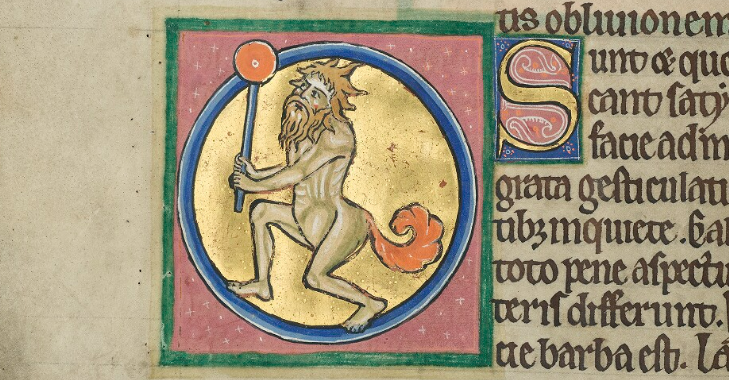
[The Communications Officer passes the torch!]
St John’s College MS. 61, f. 15 v.
By permission of the President and Fellows of St John’s College, Oxford
Viewable in full at Digital Bodleian

